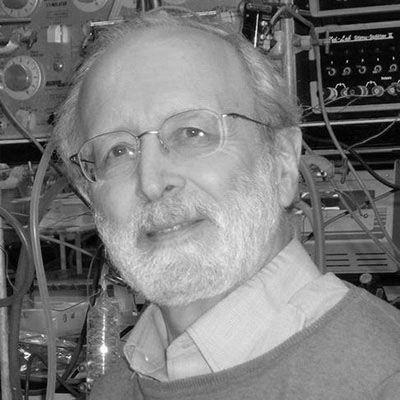
PROFESSOR ROGER PERTWEE
Roger Pertwee has three degrees from the University of Oxford: MA (in biochemistry), D.Phil. (in pharmacology) and D.Sc. (in physiological sciences). He is now an Emeritus Professor at the University of Aberdeen, where he is still actively engaged in scientific research. He is also co-chairman of the International Union of Basic and Clinical Pharmacology (IUPHAR) Subcommittee on Cannabinoid Receptors, a co-ordinator of the British Pharmacological Society’s Special Interest Group on Cannabinoids, a co-founder of the International Cannabinoid Research Society (ICRS), an invited scientific advisor on cannabinoid pharmacology/therapeutics to the Beckley Foundation, and a visiting Professor at the University of Hertfordshire, has had formal cannabinoid pharmacology-related links with several pharmaceutical companies, and currently has such a link with GW Pharmaceuticals. He has served too as President of the ICRS (1997-1998 and 2007-2008), and as Chairman of the International Association for Cannabinoid Medicines (IACM; 2005-2007), and is also currently ICRS International Secretary (1992-2018) and a member of the IACM Board of Directors. He was the recipient of the 2002 Mechoulam Award “for his outstanding contributions to cannabinoid research”. He was also awarded the 2011 Wellcome Gold Medal by the British Pharmacological Society (BPS) “for outstanding contributions to pharmacology, based mainly on research achievements”, and the 2013 IACM Special Award “for his major contributions to the re-introduction of cannabis as a medicine”, and is an Honorary Fellow of the BPS: this fellowship is awarded to BPS members who have “demonstrated distinction and peer recognition in science, or have given long and valuable service to the Society”. In addition, he was identified by Thomson Reuters in 2005 to be a “Highly Cited Researcher” and hence among “the world’s most cited and influential researchers”. He also received a Highly Cited Researcher Award from Thomson Reuters in September 2014 “in recognition of ranking among the top 1% of researchers for most cited documents in their specific field.”
Roger Pertwee presented evidence on cannabis in person at the House of Lords to the Science and Technology Committee which published its report on cannabis in 1998. He is the author of numerous review articles on the cannabinoids and is often invited to speak on the pharmacology of cannabinoids at international conferences. He is also interested in the therapeutic potential of cannabinoids. Indeed, he was a contributing author of the British Medical Association book entitled “Therapeutic Uses of Cannabis.” and served on the Royal Pharmaceutical Society working party that recommended and helped to design clinical trials with cannabis and THC that were carried out in the UK and funded by the Medical Research Council. Together with Drs Rik Musty and Paul Consroe he also carried out the first large survey of multiple sclerosis patients who self-medicate with cannabis [Eur Neurol (1997) 38: 44]. His contributions to the “medicalization of cannabis” are summarized in a Witness Seminar Transcript (Vol 40), co-authored by Crowther, S.M., Reynolds, L.A. and Tansey, E.M. and published in 2010 by The Wellcome Trust Centre for the History of Medicine at UCL.
Roger Pertwee’s research focuses on the pharmacology of cannabinoids. He began his work in this area in 1968 as a post-doc with Professor Sir William Paton at the Department of Pharmacology, Oxford University. He initially worked with cannabis and also with delta-9-tetrahydrocannabinol (THC) and cannabidiol, both of which were extracted from tincture of cannabis, then still a legal medicine in the UK. This research led to the demonstration that cannabidiol is a highly effective inhibitor of hepatic microsomal enzymes and to the development of the “ring immobility test”, still widely used as a behavioural bioassay.
After moving to Aberdeen in 1974, Roger Pertwee continued with his cannabinoid research, initially investigating the basis for the hypothermic effect of THC. This work provided evidence that THC lowers the thermoregulatory set point such that animals regulate their core temperature at a lower level than normal by adjusting heat gain and heat loss both autonomically and behaviourally. In other research carried out during this time he found that cannabinoids interact synergistically with benzodiazepines and also identified the globus pallidus as one of the sites at which cannabinoids alter motor function.
Opioid research with the mouse isolated vas deferens being carried out in Professor Hans Kosterlitz’s laboratory in Aberdeen gave Roger Pertwee the opportunity to establish whether this tissue would also serve as a bioassay for cannabinoids. The mouse vas deferens turned out to be an extremely sensitive quantitative assay for CB1 agonists. He presented some of the initial vas deferens data at a cannabinoid meeting in Palm Beach in 1991 and this led to a collaboration with Professor Raphael Mechoulam who was also at the meeting. As a result, using the mouse vas deferens, Roger Pertwee (with Graeme Griffin) was able to provide the first evidence that anandamide not only binds to cannabinoid receptors (Dr William Devane’s data) but also activates these receptors, greatly strengthening the argument that anandamide is an endogenous cannabinoid/endocannabinoid [Science (1992) 258:1946]. Other research in his laboratory, led by Dr Angela Coutts, was directed at mapping out the distribution of cannabinoid receptors in brain and gut using immunohistochemical techniques.
His research has also played major roles in:
the discovery that ethanolamides that are formed from dietary omega-3 polyunsaturated fatty acids and that seem to be endocannabinoids, have the capacity to inhibit cancer cell growth and proliferation;
the discovery of a cannabinoid CB1 receptor allosteric site;
the discovery that delta-9-tetrahydrocannabivarin is a plant cannabinoid (phytocannabinoid) – and that this compound is both a cannabinoid CB1 receptor blocker (antagonist) and a cannabinoid CB2 receptor activator (agonist) that has the potential to treat drug dependence, Parkinson’s disease, stroke, obesity and liver diseases, and to reduce health risks associated with liver transplantation;
the pharmacological characterization of other phytocannabinoids, including cannabidiol, cannabidiolic acid & cannabigerol, and the further pharmacological characterization of THCV;
the discovery/pharmacological characterization of novel synthetic cannabinoids many of which are widely used by cannabinoid researchers as experimental tools, e.g.
– methanandamide, the first CB1 receptor-selective agonist (with Dr Alexandros Makriyannis);
– two other CB1-selective agonists: ACEA & ACPA (with Dr Cecelia Hillard);
– HU-308, a CB2-selective agonist (with Dr Raphael Mechoulam);
– AM281, a widely-used CB1 receptor antagonist, and AM630, a widely-used CB2 receptor antagonist (with Dr Alexandros Makriyannis);
– CB1 receptor “neutral” antagonists;
– O-1057, the first water-soluble cannabinoid receptor ligand (with Drs Billy Martin and Raj Razdan);
– novel positive and negative allosteric modulators of the CB1 receptor (with Dr Ganesh Thakur).
Research now being carried out in Roger Pertwee’s laboratory is directed (i) at seeking out further pharmacological actions of phytocannabinoids, (ii) at elucidating the pharmacological actions of other constituents of cannabis, and (iii) at exploring the actions and therapeutic potential of novel synthetic allosteric modulators of cannabinoid receptors. This research, which is being conducted mainly using radioligand binding assays and in vitro bioassays that measure drug effects on cannabinoid receptor signalling (e.g. [35S]GTPgammaS binding assays), is currently supported by the US National Institute on Drug Abuse (part of NIH) and by GW Pharmaceuticals. He is also presently collaborating with colleagues at Aberdeen University in cannabinoid research funded by Diabetes UK and by Medical Research Scotland
[custom-twitter-feeds]
